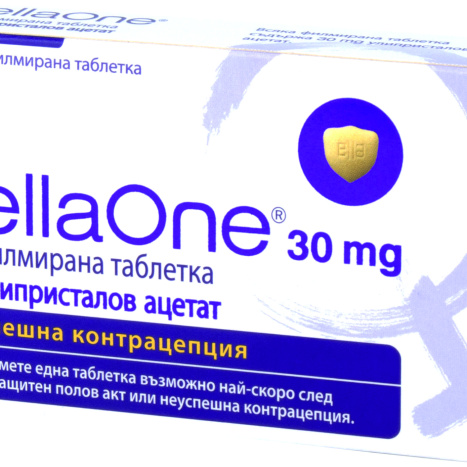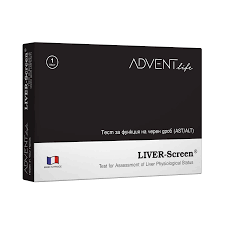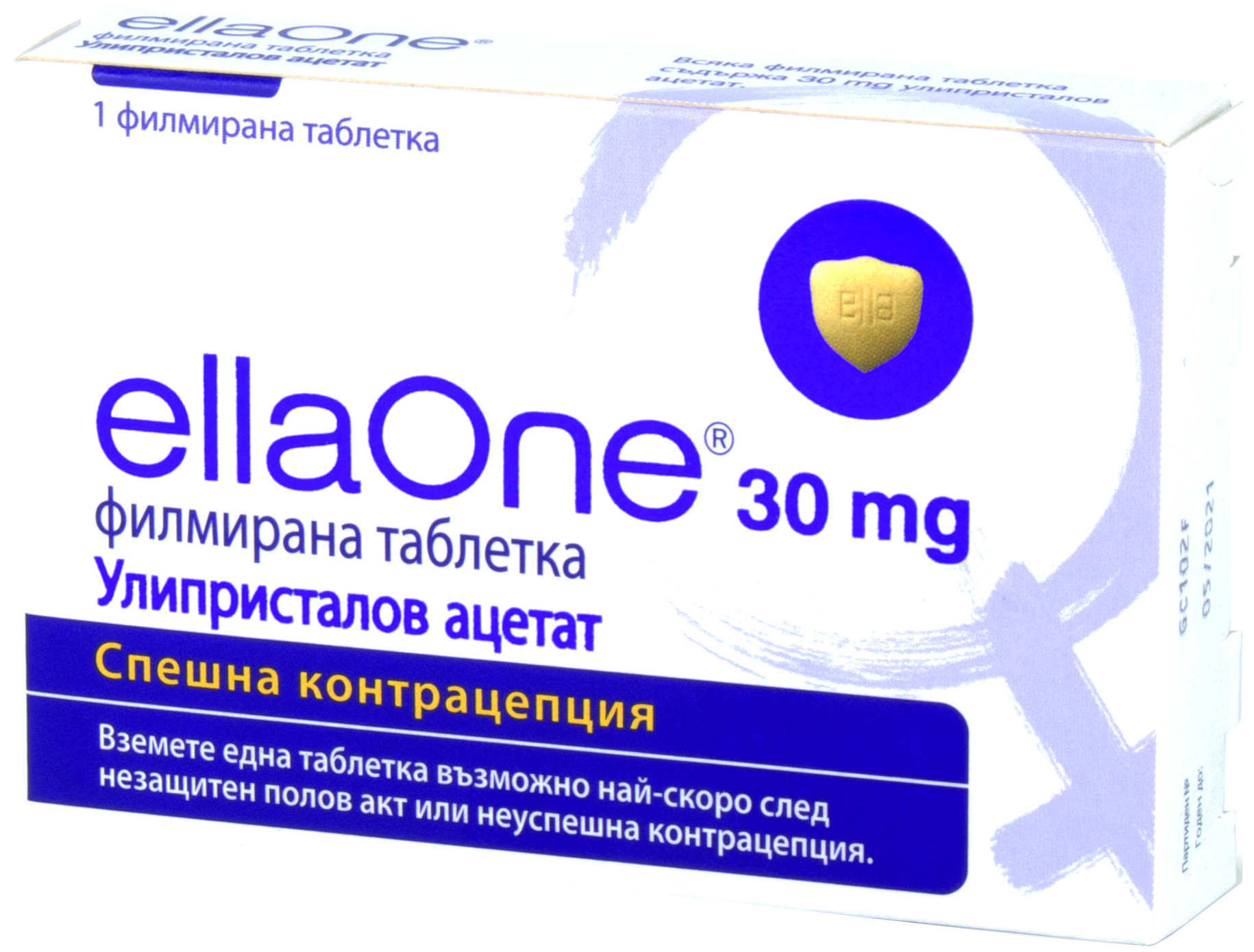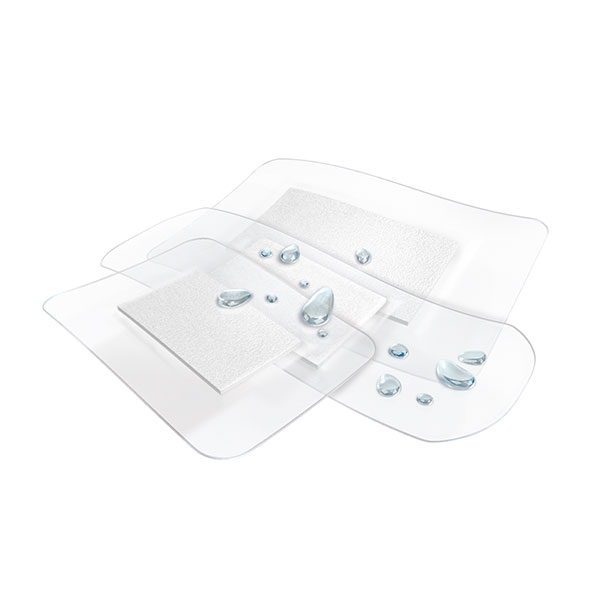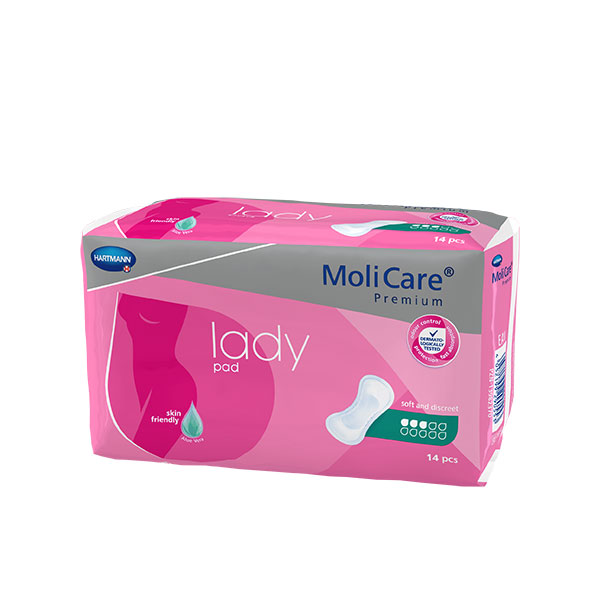ELLA ONE 30mg x 1 tabl
Leaflet: user information
ellaOne 30 mg film-coated tablet
Ulipristal acetate (Ulipristal acetate)
Read all of this leaflet carefully before you start taking this medicine because it contains important information for you.
Always take this medicine exactly as described in this leaflet or as your pharmacist, doctor or other healthcare professional has told you.
- Keep this leaflet. You may need to read it again.
- If you need further information or advice, ask your pharmacist.
- If you get any side effects, tell your pharmacist, doctor or other medical professional. This also includes any possible side effects not described in this leaflet. See point 4.
What this leaflet contains
1. What ellaOne is and what it is used for
2. What you need to know before you take ellaOne
3. How to take ellaOne
4. Possible side effects
5. How to store ellaOne
6. Contents of the package and additional information
- Useful information about contraception
1. What ellaOne is and what it is used for
ellaOne is an emergency contraceptive
ellaOne is a contraceptive that is designed to prevent pregnancy after unprotected intercourse or if your contraceptive method has failed. For example:
- if you had unprotected sex;
- if your or your partner's condom tears, slips or falls, or if you forget to use a condom;
- if you have not taken your contraceptive pill as recommended.
You should take the tablet as soon as possible after intercourse and no later than 5 days (120 hours).
This is done because sperm can survive in your body for up to 5 days after intercourse.
This medicine is suitable for any woman of childbearing potential, including in adolescence.
You can take the tablet at any time of the menstrual cycle.
ellaOne does not work if you are already pregnant .
If your period is late, there is a possibility that you are pregnant. If your period is late or if you have symptoms of pregnancy (breast pain, morning sickness), you should consult your doctor or other medical professional before taking the tablet.
If you have unprotected sex after taking the pill, you will not be protected from pregnancy.
Unprotected intercourse at any time of the menstrual cycle can lead to pregnancy.
ellaOne should not be used for regular contraception.
If you do not have a regular method of contraception, talk to your doctor or healthcare professional about choosing one that is right for you.
How ellaOne works
ellaOne contains the substance ulipristal acetate, which works by changing the activity of the natural hormone progesterone, which is necessary for ovulation to occur. So this drug works by delaying ovulation. Emergency contraception is not always effective. Out of 100 women who take this medicine, approximately 2 become pregnant.
This medicine is a contraceptive that is used to prevent pregnancy. If you are already pregnant, the medicine will not terminate the pregnancy.
Emergency contraception does not protect against sexually transmitted infections .
Only condoms can protect you from sexually transmitted infections. This medicine will not protect you from HIV infection, nor from other sexually transmitted diseases (eg, chlamydia, genital herpes, genital warts, gonorrhea, hepatitis B, and syphilis). If you have any concerns, consult a medical professional.
There is further information about contraception at the end of this leaflet.
2. What you need to know before you take ellaOne
Do not take ellaOne
- if you are allergic to ulipristal acetate or any of the other ingredients of this medicine (listed in section 6).
Warnings and precautions
Talk to your pharmacist, doctor or other healthcare professional before taking this medicine
- if your period is late or if you have symptoms of pregnancy (breast pain, morning sickness), as you may already be pregnant (see section "Pregnancy, breast-feeding and fertility");
- if you suffer from severe asthma;
- if you suffer from severe liver disease.
For all women, emergency contraception should be used as soon as possible after unprotected intercourse. There is some evidence that this medicine may be less effective with increasing body weight or body mass index (BMI), but these data are limited and inconclusive. Therefore, ellaOne is still recommended for all women, regardless of their body weight or BMI.
You are advised to speak to a healthcare professional if you are concerned about problems related to the use of emergency contraception.
If you become pregnant despite taking this medicine, it is important to see your doctor. For more information, see section "Pregnancy, breastfeeding and fertility"
Other contraceptives and ellaOne
This medicine may temporarily reduce the effectiveness of common hormonal contraceptives, such as birth control pills and patches. If you are currently taking hormonal contraceptives, continue to use them as usual after taking this medicine, but be sure to use condoms with every intercourse until your next period.
Do not take ellaOne with another emergency contraceptive pill that contains levonorgestrel. Taking them together may make this medicine less effective.
Other medicines and ellaOne
Tell your pharmacist, doctor or other healthcare professional if you are taking or have recently taken any other medicines, including those obtained without a prescription or herbal medicines.
Some medicines can make ellaOne less effective. If you have taken any of the medicines listed below in the last 4 weeks, ellaOne may not be suitable for you. Your doctor may prescribe another type of (non-hormonal) emergency contraception, e.g. copper intrauterine device (Cu-IUD):
- medicines used to treat epilepsy (eg primidone, phenobarbital, phenytoin, fosphenytoin, carbamazepine, oxcarbazepine and barbiturates);
- medicines to treat tuberculosis (eg rifampicin, rifabutin);
- HIV treatment (ritonavir, efavirenz, nevirapine);
- a medicine used to treat fungal infections (griseofulvin);
- products of plant origin containing St. John's wort ( Hypericum perforatum ).
Talk to your doctor or pharmacist before using ellaOne if you are using (or have recently used) any of the medicines listed above.
Pregnancy, lactation and fertility
Pregnancy
If your period is late, before taking this medicine you should tell your pharmacist, doctor or other healthcare professional, or take a pregnancy test to make sure you are not already pregnant (see section "Warnings and precautions" ).
This medicine is a contraceptive that is used to prevent pregnancy. If you are already pregnant, the medicine will not terminate the pregnancy.
If you become pregnant despite using this medicine, there is no evidence that taking it will affect your pregnancy. However, it is important to see your doctor. As with any pregnancy, your doctor may want to determine whether the pregnancy is ectopic. This is especially important if you have severe abdominal pain or bleeding, or if you have had an ectopic pregnancy, fallopian tube surgery or a long-term (chronic) genital infection in the past.
If you become pregnant despite using ellaOne, we encourage you to ask your doctor to register your pregnancy in an official registry. You can also report this information yourself at the web address www.hra-pregnancy-registry.com. Your information will remain confidential - no one will know that this information is about you. Your sharing of information may help future women learn about the safety or risks of ellaOne during pregnancy.
Breastfeeding
If you take this medication while breastfeeding, you should stop breastfeeding for one week after taking this medication. During this time, it is recommended that you use a breast pump to maintain the production of breast milk, but discard the expressed breast milk.
Fertility
This medicine does not affect your future fertility. If you have unprotected sex after taking this medicine, you will not be protected from pregnancy. Therefore, it is important to use condoms until your next period.
If after taking this medicine you wish to start or continue with one of the usual methods of contraception, you may do so, but you must also use condoms until your next period.
Driving and using machines
Some women experience dizziness, drowsiness, blurred vision and/or loss of concentration after taking this medicine (see section 4). If you experience such symptoms, you should not drive or operate machinery.
ellaOne contains lactose
If you have been told by your doctor or other healthcare professional that you have an intolerance to some sugars, tell your pharmacist before taking this medicine.
3. How to take ellaOne
Always take this medicine exactly as described in this leaflet or as your pharmacist, doctor or other healthcare professional has told you. If you are not sure, ask your pharmacist or doctor.
How to take ellaOne film-coated tablet
- Take one tablet by mouth as soon as possible and no later than 5 days (120 hours) after unprotected intercourse or contraceptive failure. Take the tablet immediately.
- You can take the tablet at any time during your menstrual cycle.
- You can take the tablet at any time of the day, both before and during a meal or after a meal.
- If you are taking any of the medicines that can make ellaOne less effective (see section 2, 'What you need to know before you take ellaOne') or if you have taken any of them in the last 4 weeks, ellaOne may be more - little effective for you. Talk to your doctor or pharmacist before using ellaOne. Your doctor may prescribe another type of (non-hormonal) emergency contraception, e.g. Cu-IUD.
If you vomit after taking ellaOne
If you vomit within 3 hours of taking the tablet, take a second tablet as soon as possible.
If you have intercourse again after taking ellaOne
If you have unprotected sex after taking the pill, you will not be protected from pregnancy. After taking the pill and until your next period, you must use condoms in every case of sexual intercourse.
If your next period is late after taking ellaOne
After taking the tablet, it is normal for your next period to be a few days late.
However, if your period is more than 7 days late, if it is unusually weak or unusually heavy; or if you have developed symptoms of pregnancy, such as abdominal pain, breast tenderness, nausea, or vomiting, you may be pregnant. You should take a pregnancy test right away. If you are pregnant, it is important to see your doctor. (see section "Pregnancy, breast-feeding and fertility")
If you take more ellaOne than you should
There have been no reports of harmful effects from taking a higher than recommended dose of this medicine. However, ask your pharmacist, doctor or other medical professional for advice.
If you have any further questions on the use of this medicine, ask your pharmacist, doctor or other healthcare professional.
4. Possible side effects
Like all medicines, this medicine can cause side effects, although not everybody gets them.
Some symptoms, such as breast tenderness and abdominal pain, vomiting, nausea, are also possible signs of pregnancy. If your period has skipped and you experience similar symptoms after taking ellaOne, you should take a pregnancy test (see section "Pregnancy, breast-feeding and fertility").
Common side effects (may affect up to 1 in 10 people)
- nausea, abdominal pain or discomfort, vomiting
- painful menstruation, pelvic pain, breast tenderness
- headache, dizziness, mood swings
- muscle pain, back pain, fatigue
Uncommon side effects (may affect up to 1 in 100 people)
- diarrhea, heartburn, gas, dry mouth
- unusual or irregular vaginal bleeding, heavy/long periods, premenstrual syndrome, vaginal irritation or discharge, decreased or increased sex drive
- heat waves
- changes in appetite, emotional disturbances, restlessness, anxiety, insomnia, drowsiness, migraine, visual disturbances
- flu
- acne, skin lesions, itching
- high fever, chills, general malaise
Rare side effects (may affect up to 1 in 1,000 people)
- genital pain or itching, pain during intercourse, ruptured ovarian cyst, unusually light periods
- loss of concentration, dizziness, tremors, disorientation, fainting
- unusual sensations in the eyes, redness of the eyes, sensitivity to light
- dry throat, taste disturbance
- hives (itchy rash), thirst
Reporting adverse reactions
If you get any side effects, tell your doctor, pharmacist or other healthcare professional. This includes all possible side effects not described in this leaflet. You can also report side effects directly through the national reporting system listed in Annex V. By reporting side effects, you can
to contribute to getting more information about the safety of this medicine.
5. How to store ellaOne
Keep out of the reach of children.
Do not use this medicine after the expiry date which is stated on the carton and blister after EXP. The expiration date corresponds to the last day of the specified month.
This medicinal product does not require special storage conditions.
Do not throw medicines down the drain. Ask your pharmacist how to dispose of medicines you no longer use. These measures will help protect the environment.
6. Contents of the package and additional information
What ellaOne contains
- The active substance is ulipristal acetate. Each film-coated tablet contains 30 milligrams of ulipristal acetate.
- The other ingredients are: Tablet core: lactose monohydrate, povidone, croscarmellose sodium, magnesium stearate; Film coating: poly(vinyl alcohol) (E1203), macrogol (E1521), talc (E553b), titanium dioxide (E171), polysorbate 80 (E433), iron oxide yellow (E172), potassium aluminum silicate (E555).
What ellaOne looks like and what the pack contains
ellaOne is a golden shield-shaped film-coated tablet (approximately 10.8 mm in diameter) engraved with 'ella' on both sides.
ellaOne is supplied in a cardboard box containing one blister of 1 film-coated tablet.
License holder
LABORATOIRE HRA PHARMA
200 avenue de Paris
92320 CHATILLON
France
email: info-ella@hra-pharma.com
Manufacturer
Cenexi
17, rue de Pontoise
F-95520 Osny
France
Delpharm Lille SAS
Parc d'activités Roubaix-Est
22, rue de Toufflers
CS 50070
59452 Lys-Lez-Lannoy
France
For further information about this medicinal product, please contact the local representative of the Marketing Authorization Holder:
Bulgaria MagnaPharm Bulgaria EAD Tel.: + 359 800 12 400 |
USEFUL INFORMATION ABOUT CONTRACEPTION
MORE INFORMATION ABOUT EMERGENCY CONTRACEPTION
The sooner you take emergency contraception, the better your chances of avoiding pregnancy.
Emergency contraception will not affect your fertility.
Emergency contraception can delay ovulation within a certain menstrual cycle, but it won't prevent you from getting pregnant if you have unprotected sex again. After you take emergency contraception and while you wait for your next period to start, you should use condoms every time you have sex.
MORE INFORMATION ABOUT COMMON CONTRACEPTION
If you have taken emergency contraception and are not using a regular contraceptive method (or if there is no method that is suitable for you), talk to your doctor or family planning clinic for advice. There are many different types of birth control, and you should be able to find a method that works for you.
Examples of common contraceptive methods: Methods with daily application Contraceptive pill | |
Weekly or monthly application methods | |
Contraceptive patch | Vaginal ring |
Long acting methods | |
Contraceptive implant | IUD (intrauterine device - spiral) |


